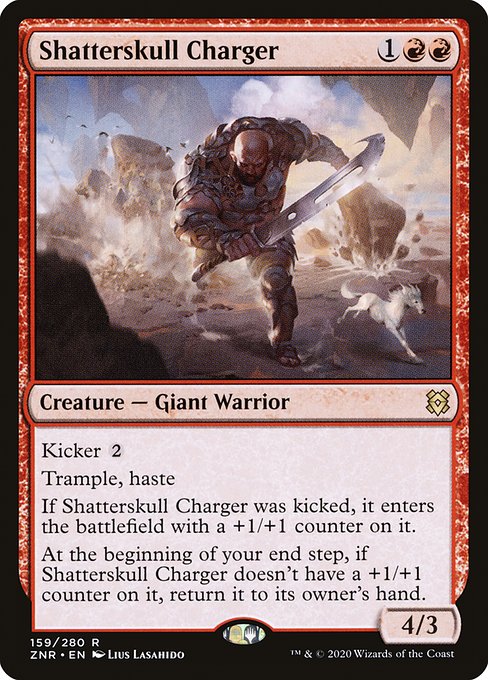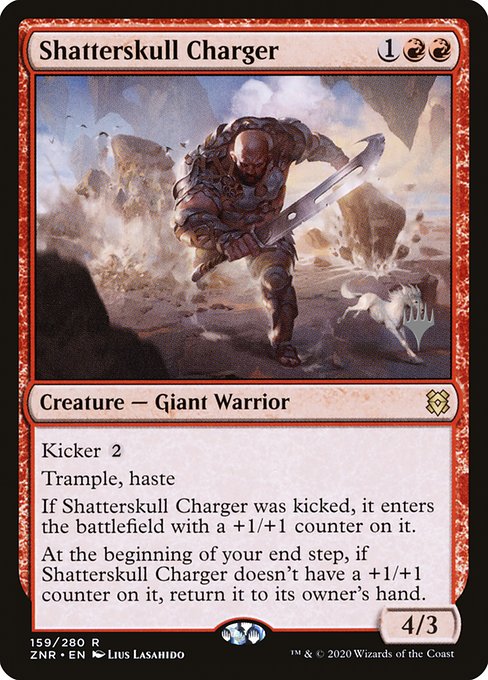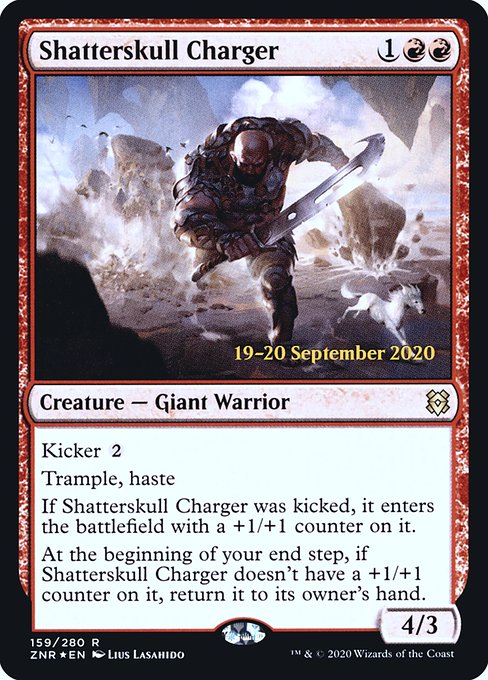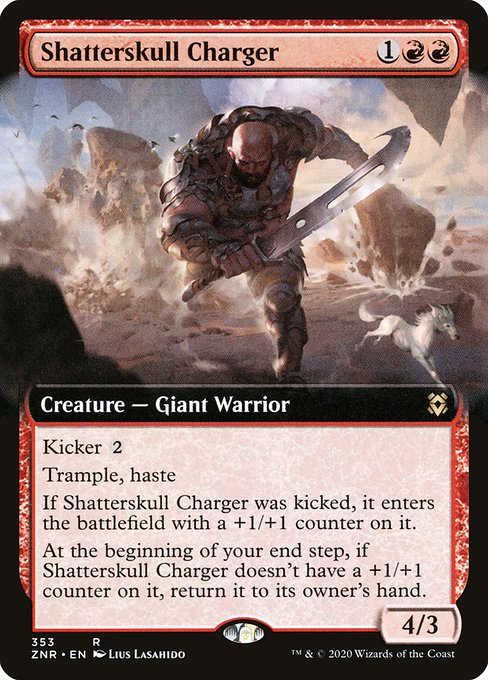standard
future
historic
gladiator
pioneer
explorer
modern
legacy
pauper
vintage
penny
commander
brawl
alchemy
paupercommander
duel
oldschool
premodern
Rulings
An ability that triggers when a player casts a kicked spell resolves before the spell that caused it to trigger, but after targets have been chosen for that spell. It resolves even if that spell is countered.
If you put a permanent with a kicker ability onto the battlefield without casting it, you can’t kick it.
Some instant or sorcery spells require alternative or additional targets if they’re kicked. You ignore these targeting requirements if those spells aren’t kicked, and you can’t kick those spells unless you can choose the appropriate targets. On the other hand, you can kick a permanent spell even if you won’t be able to choose targets for an enters-the-battlefield ability of that permanent once the spell resolves.
Kicker represents an optional additional cost that you may choose to pay as you cast the spell. A spell cast with that additional cost paid is “kicked.”
To determine a spell’s total cost, start with the mana cost (or an alternative cost if another card’s effect allows you to pay one instead), add any cost increases (such as kicker), then apply any cost reductions. The converted mana cost of the spell is determined only by its mana cost, no matter what the total cost to cast the spell was.
You can’t pay a kicker cost more than once.
If you copy a kicked spell, the copy is also kicked. If a card or token enters the battlefield as a copy of a permanent that’s already on the battlefield, the new permanent isn’t kicked, even if the original was.
If you put a permanent with a kicker ability onto the battlefield without casting it, you can’t kick it.
Some instant or sorcery spells require alternative or additional targets if they’re kicked. You ignore these targeting requirements if those spells aren’t kicked, and you can’t kick those spells unless you can choose the appropriate targets. On the other hand, you can kick a permanent spell even if you won’t be able to choose targets for an enters-the-battlefield ability of that permanent once the spell resolves.
Kicker represents an optional additional cost that you may choose to pay as you cast the spell. A spell cast with that additional cost paid is “kicked.”
To determine a spell’s total cost, start with the mana cost (or an alternative cost if another card’s effect allows you to pay one instead), add any cost increases (such as kicker), then apply any cost reductions. The converted mana cost of the spell is determined only by its mana cost, no matter what the total cost to cast the spell was.
You can’t pay a kicker cost more than once.
If you copy a kicked spell, the copy is also kicked. If a card or token enters the battlefield as a copy of a permanent that’s already on the battlefield, the new permanent isn’t kicked, even if the original was.
Rulings
An ability that triggers when a player casts a kicked spell resolves before the spell that caused it to trigger, but after targets have been chosen for that spell. It resolves even if that spell is countered.
If you put a permanent with a kicker ability onto the battlefield without casting it, you can’t kick it.
Some instant or sorcery spells require alternative or additional targets if they’re kicked. You ignore these targeting requirements if those spells aren’t kicked, and you can’t kick those spells unless you can choose the appropriate targets. On the other hand, you can kick a permanent spell even if you won’t be able to choose targets for an enters-the-battlefield ability of that permanent once the spell resolves.
Kicker represents an optional additional cost that you may choose to pay as you cast the spell. A spell cast with that additional cost paid is “kicked.”
To determine a spell’s total cost, start with the mana cost (or an alternative cost if another card’s effect allows you to pay one instead), add any cost increases (such as kicker), then apply any cost reductions. The converted mana cost of the spell is determined only by its mana cost, no matter what the total cost to cast the spell was.
You can’t pay a kicker cost more than once.
If you copy a kicked spell, the copy is also kicked. If a card or token enters the battlefield as a copy of a permanent that’s already on the battlefield, the new permanent isn’t kicked, even if the original was.
If you put a permanent with a kicker ability onto the battlefield without casting it, you can’t kick it.
Some instant or sorcery spells require alternative or additional targets if they’re kicked. You ignore these targeting requirements if those spells aren’t kicked, and you can’t kick those spells unless you can choose the appropriate targets. On the other hand, you can kick a permanent spell even if you won’t be able to choose targets for an enters-the-battlefield ability of that permanent once the spell resolves.
Kicker represents an optional additional cost that you may choose to pay as you cast the spell. A spell cast with that additional cost paid is “kicked.”
To determine a spell’s total cost, start with the mana cost (or an alternative cost if another card’s effect allows you to pay one instead), add any cost increases (such as kicker), then apply any cost reductions. The converted mana cost of the spell is determined only by its mana cost, no matter what the total cost to cast the spell was.
You can’t pay a kicker cost more than once.
If you copy a kicked spell, the copy is also kicked. If a card or token enters the battlefield as a copy of a permanent that’s already on the battlefield, the new permanent isn’t kicked, even if the original was.
Votre collection ? vos decks ?
Envie de gérer votre collection et/ou créer des decks ?



 0
0
 0.13€
0.13€

